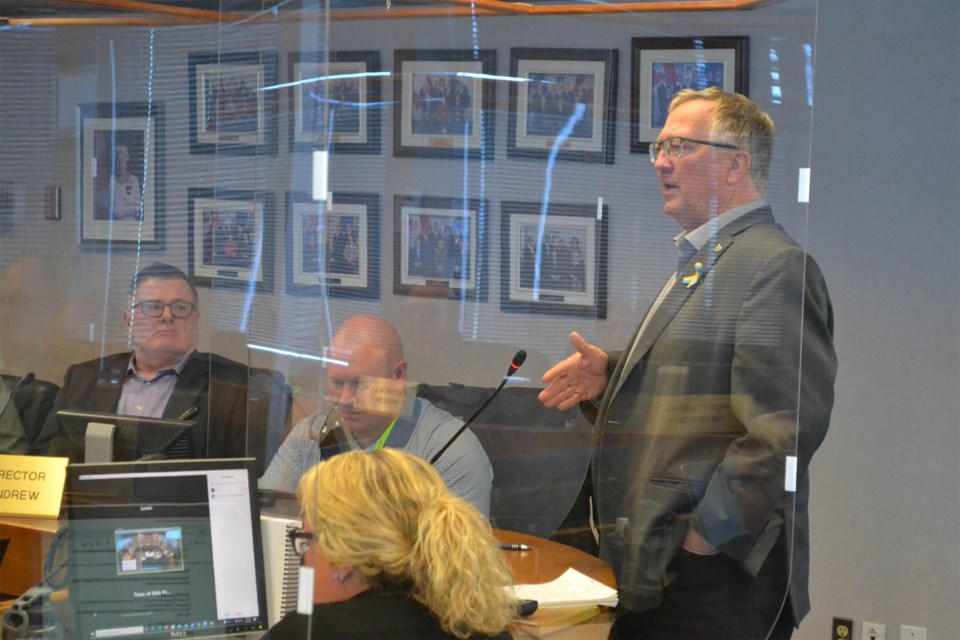OLDS — Some people calling for green energy infrastructure don’t realize how much petroleum-related or derived products make up that infrastructure, Red Deer-Mountain View Member of Parliament Earl Dreeshen says.
Dreeshen says he wants to make that point in his new role as co-chair of the House of Commons' Standing Committee on Environment and Sustainable Development.
He made that point during a recent address to the Town of Olds council.
Dreeshen said it’s his understanding that it takes 17 tons of material to build a windmill. Of that figure, seven tons is plastic.
The same goes for electric vehicles. Dreeshen pointed out that ingredients for electric vehicle batteries are mined.
"You don’t produce electric vehicles without oil and gas, plastic and everything else. That is needed," he said.
"You don’t produce batteries without digging up a little bit of dirt. And when you do that, I mean, you kind of know how difficult it is.
“People don’t quite understand that you can’t simply shut down an industry because you think that the word is scary. You have to understand things that are there.”
Dreeshen also said he recently spoke with representatives of Dow Chemical who informed him of progress they’ve made toward zero emission products at their Fort Saskatchewan facility.
"I’m definitely there to bring a Western Canadian perspective on those things that we have and the wealth that we have built and the fact that that wealth is going to give us these opportunities in the future to be able to satisfy concerns, environmental concerns,” he said.
Federal Environment and Climate Change Minister Steven Guilbeault was expected at an upcoming Standing Committee on Environment and Sustainable Development meeting.
“I’m sure that’s going to be interesting,” Dreeshen said.
Friendly source of oil and gas
Meanwhile, Dreeshen told the Town of Olds council that the Russian invasion of Ukraine highlights the need for the U.S. and Europe to obtain oil and gas from a friendly source – Canada.
Essentially, Dreeshen said oil and gas from Western Canada could backfill energy needs for European countries and the U.S. as they look at losing their dependence on Russian oil and gas as a result of Russia’s invasion of Ukraine.
Dreeshen noted there are reports that the U.S. is looking at replacing Russian oil with that from Venezuela or Saudia Arabia.
He echoed Premier Jason Kenney’s recent pitch that oil and gas from Alberta is “ethically sourced,” compared with fossil fuels from those countries.
"It’s a tough situation,” Dreeshen said, “but I think we need some pragmatism here in order to make this work.”
Dreeshen said Bill C-69, which he said “basically stops any type of oil and gas development,” is part of the reason it’s extremely difficult to ship oil and gas out of Canada to other countries.
“We are their neighbour. We are the ones that have the other resources that they’re going to need and we need their cooperation,” he said.
If Canada doesn’t supply those resources, other countries will, he said.
“And believe me, I would much sooner see us make the money, us be able to help our schools, us be able to help our hospitals, us be able to help our social systems, us be able to help those poor people around the world," he said.
While some Indigenous people oppose oil and gas pipelines, that’s not true of all of them, he said.
“I was on Aboriginal Affairs and Northern Development for a number of years. They are the ones that are pushing for these types of things,” he said.
“They want to be part -- and yet they will find one or two people from the outside mostly -- but people who have these grandiose ideas about how they can be the hero, they can stop something.”
Dreeshen said he plans to make those points in his new role as co-chair of the House of Commons' Standing Committee on Environment and Sustainable Development.



